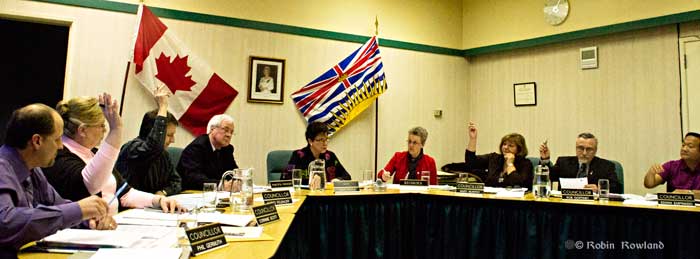
The Northern Gateway Joint Review process has been “utterly destroyed” by the Conservative government, Skeena Bulkley Valley NDP MP Nathan Cullen told reporters Friday, April 20, adding a warning those who were waiting for the JRP to complete its hearings before making up their minds, “all those people like the premier and others who said there’s a good process in place, that excuse has been ripped away.”
Earlier that week, Natural Resources Minister Joe Oliver announced that the government that would introduce legislation to “streamline” the review process for major resource developments that would include such provisions as limiting the time and the number of participants and allowing the cabinet to overrule any decision or recommendation from the National Energy Board.
Cullen, who was just named Opposition House Leader, was holding his regular conference call with northwest BC reporters.
He called the changes proposed by the Conservative government for environmental assessment, ”brutal,” adding, “the already weakened rules have become fundamentally more weak.” He said it seems that the government is going to further weaken the role of the Department of Fisheries and Oceans in checking environmental impacts.
The bill, which has yet to be tabled in the Commons, will download federal responsibility for the environment to the provinces, which Cullen said could be subject to a constitutional challenge.
On the controversial Enbridge Northern Gateway project, which would see twin bitumen and condensate pipelines from Alberta to Kitimat, Cullen said, while the government’s Northern Gateway policy was not mentioned in the news conference or briefing documents, it was buried deep on the website and that indicated “it will not be up to the NEB anymore, they will retroactively apply these new rules it will now become a purely political decision. The prime minister, with all his wisdom, is going to make the final decision on the pipeline, totally undermining the process we are in now across the region.”
(The key bureaucratic phrase actually reads: “Establish clearer accountability for decisions on major pipeline projects in the national interest by giving government authority to make the “go/no go” decisions, based on the recommendations of the National Energy Board.” )
Cullen said he is already hearing that people in the northwest are frustrated and angry by the announcement. “They feel that they’ve been duped and the credibility of the panel has been destroyed by this government. And so all those people like the premier, who said the process was what they were waiting for, that process has now been utterly, utterly, destroyed.”
Cullen was inferring any decision to support or oppose the pipeline is now back in the courts of BC Premier Christy Clark and groups like District of Kitimat Council and Terrace Chamber of Commerce who have, up until now, remained neutral, waiting for the final report from the Joint Review Panel.
The Terrace Chamber of Commerce, for example, said:
We want the objective panel of experts to assess the concerns of affected parties and contrast them with procedures and equipment being positioned to mitigate any and all perceived risks. It is important that all voices are heard and all questions are asked and answered.
“The process was always threatened, a lot of people suspected that Stephen Harper would not accept a ‘no’ when it comes to this pipeline and now that’s been made explicit. And all those people like the premier and others who said there’s a good process in place that excuse has been ripped away,” Cullen said.
Cullen said he believes that people should still participate in the hearings but the panel now has to justify its existence.
“At the same time.“ Cullen said, “the government has shut down the oil response group in Vancouver and moved it 5,000 kilometres to Quebec, they’ve cut funding on our ability to protect the coast, even after the auditor general has pointed out that the current ability to protect our waters is lacking, so it looks that they are going to do everything and anything to approve this pipeline and put at risk so much of what we care about. It’s a shame but I don’t think it will lessen the resolve of people.”
Cullen called Joe Oliver’s statement that there would be more money for enforcement of environmental regulations a “shell game.”
“They cut they cut $80 million and put back $13 million and tried to pretend that’s an increase.
There is less protection for our ocean environment. At the same time, they’re pushing two major pipelines to the west coast and increasing the risk dramatically. Shutting down the operations in Vancouver, while trying to put a pipeline right into Vancouver, smacks of some sort of hypocrisy or arrogance. I mean they’re claiming budget cuts, but the prime minister is spending more on is own office, and they’re not making a single dollar cut to the F-35, which are in the billions. It’s peanuts they’re pretending to save here and it’s putting very important things at risk in our oceans.”
He expects the bill changing the rules for resource development to be introduced next week. But, Cullen added, that it is clear that government has been planning this for sometime, a fact that further undermines the credibility of the Northern Gateway Joint Review Panel. “What the government has just said is, ‘We simply don’t care. We’ve already made up our minds before hearing any testimony.’ I think they’ve made up their minds in advance of this but now it’s obvious that it was always true. You don’t put legislation like this together in a week. The bill that they are going to introduce and the press conference they had last weekend were months in the making. I know how Ottawa works. This has been around for a long time and they knew this for a long time. It’s entirely cynical.”
He expects the government will try and ram the legislation through the House and one of his jobs as NDP and Opposition House leader will be to slow it down.
“I think the very cynical anti-democratic move by the government is only going to increase the number of Canadians that will be opposed to this. So getting the message out specifically, getting people rallied around this cause and letting the government know they’re not going to steamroll us…. Continuing to try to bully us into submission is about the dumbest tactic imaginable, but I guess that’s the only one available to them. If the only tool you have the toolbox is a hammer, I guess every problem is a nail.
“Fundamentally this is a question of trust, do we trust that this government will protect the environment when it comes to oil and gas projects? And I can’t imagine an oil pipeline that Steven Harper doesn’t love. Maybe if the project went right through his living room, he may have some questions about it, but outside of that, there isn’t been a single thing that the oil industry has wanted from this government that they haven’t got, not one thing. So do you trust them to protect fisheries, do you expect them to protect us from oil spills? The answer has got to be no.”








